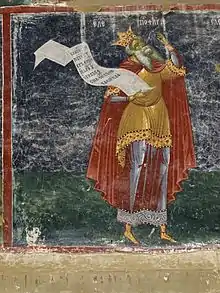Against the Christians
Against the Christians (Greek: Κατὰ Χριστιανῶν; Adversus Christianos) is a late-3rd century book written by Roman-Phoenician Neoplatonic philosopher Porphyry of Tyre, criticizing the writings of Christian philosophers and theologists. Due to widespread censorship by Christian imperial authorities, no known copies of this book exist. Only through references to it in Christian writings attacking it can its contents be reconstructed.
 Porphyry, c. 1535, Sucevița Monastery. | |
| Author | Porphyry of Tyre |
|---|---|
| Language | Greek |
| Published | c. 275-300 AD |
Background
During his retirement in Sicily, Porphyry wrote Against the Christians (Κατὰ Χριστιανῶν; Adversus Christianos) which consisted of fifteen books. Some thirty Christian apologists, such as Methodius, Eusebius, Apollinaris, Augustine, Jerome, etc., responded to his challenge. In fact, everything known about Porphyry's arguments is found in these refutations, largely because Theodosius II ordered every copy burned in A.D. 435 and again in 448.[1][2][3][4]
Porphyry became one of the most able pagan adversaries of Christianity of his day. His aim was not to disprove the substance of Christianity's teachings but rather the records within which the teachings are communicated.[5] Augustine and the 5th-century ecclesiastical historian Socrates of Constantinople, assert that Porphyry was once a Christian.[6]
Contents
As quoted by Jerome, Porphyry mocked Paul and the early Christians while suggesting that the 'magical arts' performed by Jesus of Nazareth and his followers were nothing special, done similarly by other figures of Greco-Roman history:
'He did it all for money; [...] (They were) poor and country-dwelling men, seeing that they used to have nothing; certain wonders were worked with magical arts. Not that it is unusual however to do wonders; for the magicians in Egypt also did wonders against Moses, Apollonius also did them, Apuleius also did them, and any number have done wonders. [they did wonders by magical arts] so that they might receive riches from rich and impressionable women, whom they had led astray.'
Prophecy of Daniel
According to Jerome, Porphyry especially attacked the prophecy of Daniel because Jews and Christians pointed to the historical fulfillment of its prophecies as a decisive argument. But these prophecies, he maintained, were written not by Daniel but by some Jew who in the time of Antiochus Epiphanes (d. 164 BC) gathered up the traditions of Daniel's life and wrote a history of recent past events but in the future tense, falsely dating them back to Daniel's time.
'Daniel was right. Finally what he had told up to Antiochus contained true history; if anything was guessed beyond that point it was false, for he had not known the future.'
The first part of Daniel, with the exception of the dream in Daniel 2, is historic, not prophetic. Porphyry, attacking only the prophetic portion, declares it to be merely a late anonymous narrative of past events, purporting to have been predicted long before by Daniel. Thus Porphyry's scheme was based on the supposed spuriousness of Daniel's prophecies.[7]
Porphyry devised his own interpretation where the third “prophetic kingdom” was Alexander the Great, and assigned the Macedonian Ptolemies and Seleucids to the fourth kingdom. From among these he chose ten kings, making the eleventh to be Antiochus Epiphanes. In this way he threw his main strength against the Book of Daniel, recognizing that if this pillar of faith be shaken, the whole structure of prophecy must tremble. If the writer was not Daniel, then he lied on a frightful scale, ascribing to God prophecies which were never uttered, and making claim of miracles that were never wrought. And if Daniel's authorship could be shown to be false, then Christ Himself would be proved to bear witness to an imposter. (Matt. 24: 15.)[8] Porphyry's thesis was adopted by Edward Gibbon, the English deist Anthony Collins, and most Modernist scholars.[9]
See also
References
- Digeser 1998, p. 130: "Constantine and other emperors banned and burned Porphyry's work".
- Socrates Scholasticus 1885, pp. Book I, Ch 9, pp. 30-31, Letter of Constantine proscribing the works of Porphyry and Arius.
- Stevenson 1987: Gelasius, Historia Ecclesiastica, II.36
- Froom 1950, p. 326.
- Froom 1950, p. 327.
- Socrates Scholasticus 1885b, pp. Book III, Ch 23.
- Froom 1950, p. 328.
- Froom 1950, p. 329.
- Froom 1950, p. 330.